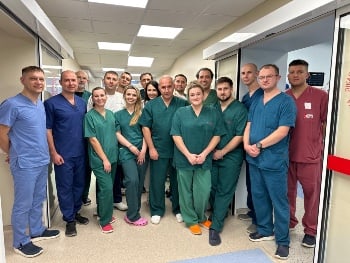Amid the persistent threat of missiles from the air and an array of hazardous terrestrial obstacles, the Heart Institute of the Ministry of Health in Kyiv has continued to provide heart transplants to Ukraine’s citizens, performing 40 of the life-saving procedures since Russia’s full-scale invasion of the country in 2022.
The Heart Institute’s Director Borys Todurov, MD, PhD, reported on his team’s extraordinary efforts today at the Annual Meeting and Scientific Sessions of the International Society for Heart and Lung Transplantation (ISHLT) in Prague.
The Heart Institute, which served as a bomb shelter early in the war, purchased its own generators and autonomous water supply to continue operating during blackouts. When it became impossible to use helicopters to transport donor organs, Dr. Todurov and his eight-person heart transplantation team had to pivot.
“Without the use of a helicopter, our organ travel time was too long. So we removed some seats from the back of a Mercedes bus and began taking our entire team and all of our equipment to the donor heart recipient,” Dr. Todurov said. “We usually drive at night, but that’s when the drones and rockets are flying everywhere as well. We need to do our work, even if it’s dangerous.”
A driver, the surgeon and two assistant surgeons, two anesthesiologists, a perfusionist, and a nurse travel for each operation. Because the clinics and hospitals throughout the country don’t have the specialized equipment for a heart transplant operation, the team must also bring its own equipment and supplies. The bus accommodates four boxes per service in addition to a bypass machine, heart-lung machine, warming and cooling devices, perfusion systems, monitors, and surgical equipment.
“We have to take everything with us because there’s no chance to fail,” he said. “The first time we packed the van, it took us four or five hours, especially trying to fit in the heart-lung machine. Now we’ve got it down to a matter of minutes.”
Dr. Todurov recalled a recent transplant operation at a regional clinic where the heart donor was in one operating room (OR) and the heart recipient lay in the adjoining OR.
“The nurses in the clinics want to help us, but they lack the expertise,” he said. “We must send the patient by ambulance back to the Heart Institute for care in the ICU following the operation.”
Finding decent roads is another obstacle for the team as it travels up to 500 kilometers to reach patients in need.
“For each trip, I must arrange special permission to drive across Ukraine’s various regions beyond curfew,” he said. “Sometimes that means traveling on heavily damaged roads or through control points with snake-like roads.”
Dr. Todurov said there’s great enthusiasm for the Heart Institute’s heart transplantation program, which is just 20 years old.
“There’s greater awareness in our country for heart donation after circulatory death (DCD), especially after we transplanted a DCD donor heart from a six-year-old boy into a four-year-old girl earlier this year.”
Despite the perils of the invasion and disruption to their daily lives, almost all of the Heart Institute’s employees have remained in place.
“Eleven million people need our help,” said Dr. Todurov. “If not us, who will help? Continuing our work every day is important. Our country is full of people, children, and life. We’re grateful for all the support we’ve been given.”

